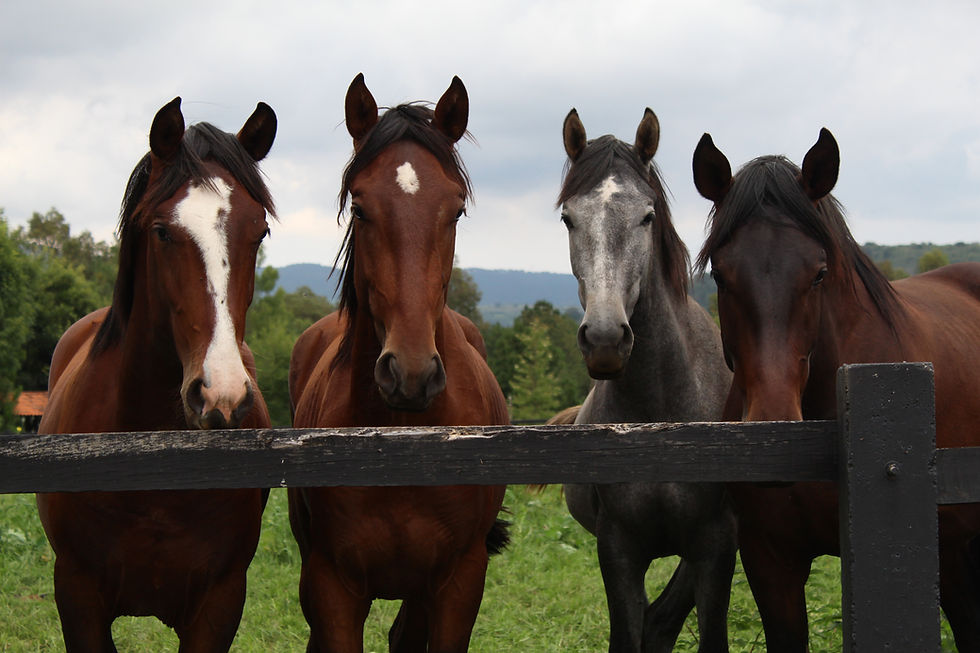Don't Feed Your Horse Like A Pig
- Nov 8, 2019
- 3 min read
Updated: Feb 8, 2024
First - consider the equine gastro-intestinal system and what it is designed to do.
In the wild, a horse travels over a large range and takes in vast amounts of forage - between 1 - 2% of the horse's body weight a day. Highly fibrous stalky grasses (many species which are seasonal, and only bearing grain briefly - and including some herbs) are torn off by incisors and then mixed with saliva and ground in the big mortar and pestle inside the horse's head (molars).

This mass then goes into a relatively small, but highly acidic stomach, through the small intestine and large intestine where it ferments like a big brewery with the aid of good bacteria (gut flora). This fermenting process is used by the horse to maintain its body temperature.
This system is already inside the horse when it's born. At Sound Advice we believe that we should be following this process that already exists inside the horse, rather than trying to feed the horse as if it was a different species - in calorie-dense meals like pigs, which are omnivores. That means that the main source of feed will be fibre - pastures and hays of mixed species.
The challenges with domestication are mainly:
1. domestic horses don't travel to forage. We need to artificially match digestible energy to activity level (calories in to calories out). The most extreme example of this is stabling.
2. most of our pastures have limited grass species that we have designed to make cattle fat in order to hasten production of beef. The limited species means there is limited nutritional value and they are generally high in sugar. Basically, your paddock is like those breakfast cereals with cartoon animals on the front.
This is where we come in. When we look at your horse's diet we will be taking into consideration:
the current condition of your horse,
its likely energy requirements given the level of activity,
what nutrition is being provided by the pasture that the horse is on,
hays that the owner has access to.
When we first started we sent pasture and hay samples to a lab to find its exact mineral profile. But these days we can also make some pretty good guesses based on samples that we have taken in the past, and symptoms of deficiencies and excesses that your horse is already displaying.

There will be shortfalls and excesses in the diet which we can address in a variety of ways. These can include limiting access to pasture, changing the design of the turnout, changing the dynamic of the herd, increasing exercise, changing the nature of the exercise, and developing a supplementary diet that addresses mineral or energy imbalances in the diet.
Where possible we will use another feed to meet the deficiency, but where there is if there is no feed that matches the imbalance we recommend a supplement, or make one for you.
But the supplements are only ever about balancing the main source of nutrition, which is pasture or hay or a combination of those.
This is why we have the tagline "only what your horse needs".
Other factors will also influence your horse's nutrition - here are some examples:
A horse may have poor teeth which limits how much tearing and grinding they are able to achieve.
A horse may have had previous gastro-intestinal injury which will make it more prone to discomfort.
A horse with musculo-skeletal imbalance may find grazing or exercising uncomfortable, which will then have a knock on effect on that horse's calories in - calories out.
This is why we are interested in the whole horse. Every horse is an individual and the circumstances of that horse - the husbandry - is going to have a huge influence on the horse's overall health. That's something we're not going to be able to factor in without eyeballing your horse in person, and having a long chat with the owner about how they keep their horse.
This is why - generally speaking, you're not going to have success just buying a tonne of nutritional supplements off the shelf. It's part of a whole system. It works best of all when we stay in touch with the owner, talking about how the horse is going - what has changed, what has improved, what still needs work.
We have been providing nutritional advice to customers for over fifteen years, and have many loyal customers. It's amazing what a difference just tweaking a few things can make to your horses health, not to mention the savings cost. Once you understand the basics it's not rocket surgery!
A good place to start is minerals we find typically deficient : Calm and Trace Mix




Comments